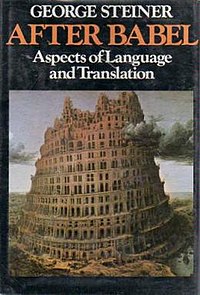 Cover of the first edition | |
| Author | George Steiner |
|---|---|
| Cover artist | The (Little) Tower of Babel by Pieter Bruegel the Elder, 1563 |
| Language | English |
| Subjects | Language, translation |
| Publisher | Oxford University Press |
Publication date | 1975 |
| Publication place | United Kingdom |
| Media type | Print (hardcover and paperback) |
| Pages | 520 (first edition) |
| ISBN | 0-19-212196-0 |
| OCLC | 1193209 |
| 418/.02 | |
| LC Class | P306 .S66 |
After Babel: Aspects of Language and Translation (1975; second edition 1992; third edition 1998) is a linguistics book by literary critic George Steiner, in which the author deals with the "Babel problem" of multiple languages.[1]
After Babel is a comprehensive study of the subject of language and translation.[2] It is both a controversial and seminal work[3] that covers a great deal of new ground and has remained the most thorough book on this topic since its publication.[2] Director Peter Bush of the British Centre for Literary Translation at the University of East Anglia described the book as a "pioneering work which revealed all communication as a form of translation, and how central translation is to relations between cultures."[4] Daniel Hahn at ContemporaryWriters.com wrote that "It is extraordinary in making a real contribution to translation studies, while remaining fairly self-contained and accessible to people who have never before given the matter a second thought."[2]
After Babel was adapted for television in 1977 as The Tongues of Men, and was the inspiration behind the creation in 1983 of the English avant-rock group News from Babel. After Babel also inspired work by cultural psychiatrist Vincenzo Di Nicola on intercultural communication and cultural family therapy, adopting "beyond Babel" as a metaphor.[5]
- ^ a b c Hahn, Daniel. "George Steiner". Contemporary Writers in the UK. Archived from the original on 1 October 2007. Retrieved 15 April 2008.
- ^ "Aspects of Language and Translation". Kwintessential: Cross Cultural Solutions. Archived from the original on 5 May 2008. Retrieved 15 April 2008.
- ^ Jaggi, Maya (17 March 2001). "George and his dragons". The Guardian, 17 March 2001. London. Archived from the original on 24 March 2008. Retrieved 15 April 2008.
- ^ DiNicola, Vincenzo F (1986). "Beyond Babel: Family therapy as cultural translation". International Journal of Family Psychiatry. 7 (2): 179–191.